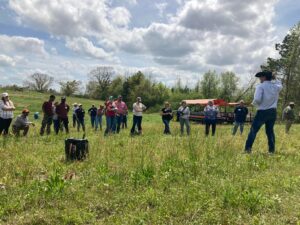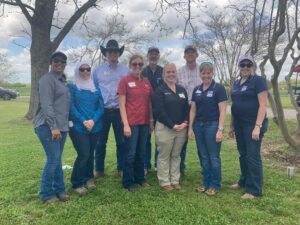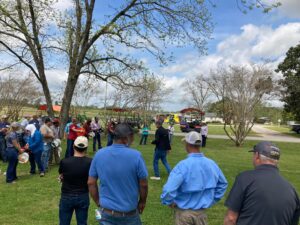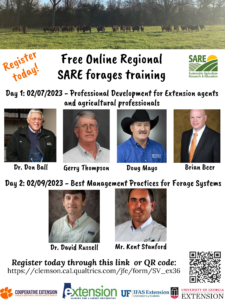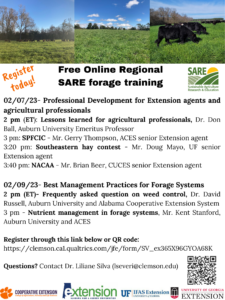Final report for SPDP21-04
Project Information
The development of this project focused on enhancing productivity, environmental quality, and profitability in agricultural production systems in Alabama and the Southeast through the development and delivery of educational resources. This initiative was a collaboration among the Alabama Cooperative Extension System (ACES), Clemson University, the University of Georgia, the University of Florida, and North Carolina State University. The goals of this project were: 1) provide in-classroom training and hands-on demonstrations to educators for tools and related concepts to increase productivity, sustainability, and profitability of forage-based livestock production systems, and 2) develop decision tools (forage quick reference guide, webinars). These tools addressed forage, soil, economic, and livestock market considerations in the region. The curriculum also included topics on the sustainability and resilience of forage-based systems considering climatic and economic issues (e.g., prolonged droughts and COVID-19 pandemic) in the region, which have increased the need to improve management strategies and incorporate new technologies. Short-term knowledge gained was accessed through pre- and post-knowledge surveys applied during training to attendees (NRCS and land-grant Extension agents, specialists, and students). Potential barriers were noted and have been used to structure future curriculum development and training. One of the major barriers is funding to be able to deliver regional training events like this in-person event carried out in Alabama. The group will continue to seek out resources to try to achieve continuity of training in a wide range of topics for Extension agents, agricultural professionals, and farmers. For the in-person training, we prioritized providing scholarships to the extension agents from different states that wanted to attend the event; therefore, we were limited in our ability to select just a handful of producers to attend the in-person event. On the other hand, we opened the online webinars to a diverse range of agricultural personnel, including students, farmers, etc, to achieve allow them to hear about the topics being delivered. Since the COVID-19 pandemic, online educational activities have expanded, and this source of information delivery allows us to potentialize the reach and engagement with educational content through a larger population beyond state and country borders.
The objectives were to develop an updated forage establishment and management curriculum for a reference guide and educational material and training for Extension agents from the Southeast region, NRCS agents, and mentor farmers aiming to increase productivity, resilience, and feasibility of forage-based systems. The specific objectives are:
1) Educational Training and Network: develop educational resources on forage, beef, soil, economics, nutrient management, animal genetics, and marketing strategies for forage-based livestock operations. The target tool for the development of this project is to provide in-classroom training and hands-on demonstrations for Extension agents and mentor farmers on tools and concepts related to increasing productivity, sustainability, and profitability of forage-based livestock production systems. Due to the COVID-19 pandemic, any in-person program delivery will be subjected to current guidelines at the time and will follow physical distancing and face-covering regulations. If needed, training will be held online, and hands-on demonstrations will be held live through media resources using internet connection through portable routers (Hot Spots). PowerPoint presentations, handouts, and other materials will be compiled and given to each attendee for further use, including local Extension activities and programs.
Outcome: Increase educational resources available to improve forage and beef production, environmental sustainability, soil quality, and profitability in livestock production operations. Knowledge gained in sustainable production practices and application of concepts following training events.
Evaluation plan: Pre- and post-knowledge surveys will be given to all attendees. After completion, a follow-up survey will be sent to mentor farmers to assess the rate of implemented practices and concepts. Similarly, a follow-up will be conducted with agents to assess the transfer of knowledge to clientele and the main barriers they are facing. The information gathered will serve to improve training quality and serve as the basis for improving the quality of following programs.
2) Reference Guide Development: Create content and distribute reference guides to clientele. This guide will address forage identification, establishment and management, soil fertility and improved management practices, agricultural economics concepts, marketing, and beef-related considerations.
Outcome: Provide an easy-to-access guide that will serve as a toolbox for decision-making agricultural operations. Provide improved agronomic, environmental, economic, and sustainable knowledge of forage-based systems.
Evaluation plan: As the distribution of resources occurs, we will monitor web metrics to determine access to related content and reference guide distribution numbers. Thus, attendance and access to content pieces, Extension publications, and training (in-person and web-based) related to topics from the guide will be monitored.
Livestock production is one of the major agricultural activities in the Southeast region. Cow-calf operations are predominant, and forages provide the primary feed source due to the favorable climatic conditions, a wide range of adapted forages, and access to local resources, such as poultry litter. When grazing forages, animals harvest their feed which reduces the costs of additional activities that would include cutting, storing, transporting, and distributing feed in operations. In recent decades, with the increasing population and limited area for agricultural expansion available, there has been an increasing need to improve forage management strategies aiming to enhance forage production, animal performance, and sustainability of forage-livestock systems.
Well-managed forage-based systems require a holistic approach to balance plant and animal needs, soil fertility, and ecosystem services delivery. In this context, there is no "one size fits all" for operations. To properly design a forage system plan is essential to understand edaphoclimatic characteristics, adapted forage species, goals, and budget of the enterprise. In this context, improved access to up-to-date Extension material and science-based training for Extension agents and agricultural professionals can enhance long-term productivity, profitability, and adoption of sustainable strategies for forage and livestock operations in the region.
Our forage textbook and training events focused on providing information on basic topics on forage systems, animal nutrition, and soil while also approaching aspects of environmental quality, animal welfare, and challenges related to climate change and their impact on agricultural systems and yield variability. It is crucial to have well-trained personnel to be able to think forward when advising farmers on management strategies and allocating resources. With the increasing number of beginning farmers, evidenced by the demand for educational programs and interest in climate-smart technologies, it is important to ensure that educational activities will cover those aspects. In the US, Extension programs have successfully used web-based resources and platforms to deliver content and educational training. The textbook and webinars generated from this grant have been easy-to-access resources and will continue to serve as a toolbox to facilitate Extension agents, agricultural professionals, and farmers to find information needed on a regular basis.
Education
In 2022, a forage-livestock curriculum and coursework were developed, resulting in a printed publication (book) and in-person training. The book was the textbook for a 2-day training held at Columbiana, AL, by a group of around 20 Specialists from Auburn University, Clemson University, University of Florida, University of Georgia, University of Tennessee, Alabama A&M University, and North Carolina State University. The audience (n=75) consisted of Extension agents, educators, and professionals associated with agricultural institutions from Alabama, Florida, Georgia, Louisiana, North Carolina, South Carolina, and Tennessee. The first day of the training was designed to be inside the classroom with several talks on various topics, and the second day was just hands-on demonstrations on the field. The focus was heavy on providing tools to the educators to replicate content and think outside the box on how to explain complex concepts and deepen their knowledge as well. We had a roundtable of more experienced agents that shared their experiences with the audience on various subjects, including the development of the program, accessing clientele, and measuring impact.
In 2023, an online training focusing on professional development topics and opportunities and weed and nutrient management was held in February. The target public was Extension agents, agricultural professionals and producers. Two 2-h sessions were with six speakers and had over 200 people in attendance during the sessions. The sessions were recorded and made available on the Forage Drops YouTube webpage. Each recording has over 160 views to date.
Education & Outreach Initiatives
Provide participants with knowledge on forages- and beef-related topics and with tools to disseminate that knowledge and replicate Extension demonstrations to facilitate understanding of concepts.
In 2022, a 2-day training was held with an audience (n=75) consistinging of Extension agents, educators, and professionals associated with agricultural institutions from Alabama, Florida, Georgia, Louisiana, North Carolina, South Carolina, and Tennessee. We had Dr. Don Ball as the keynote speaker of this event and he shared his experience and advice for agents to succeed in their programs. The first day of the training was designed to be inside the classroom with several talks on a wide variety of topics, and the second day was just hands-on demonstrations on the field. The focus was heavy to provide tools to the educators to replicate content and think outside the box on how to explain complex concepts and deepen their knowledge as well. We had a roundtable of more experienced agents that shared their experiences with the audience on a variety of subjects, including the development of the program, accessing clientele, and measuring impact.
In 2022, surveys regarding the training held on April 11-12 are still been compiled, but, participants gave high ratings for the event and the coursework associated (book). The majority of participants are requested to have hours of professional development activities logged in and the majority of respondents appreciated the opportunity to be able to participate in an event that was designed for them - how they could teach the content to their clientele. Thus, the majority of participants have requested that this event has continuity and alternate locations in coming years so they can get to learn about specificities of forage systems in different locations and are exposed to new concepts as well. Networking was a special component of this training since we had several specialists from land-grant Universities and Extension professionals from different systems and institutions coming together throughout the Southeast region. This was an unique opportunity for professionals from all levels of their careers since we were able to cover from basics to advanced aspects and provide them with coursework, curriculum and additional publications to support their program and development.
Provide participants with knowledge on professional development and weed and nutrient management topics and with tools to disseminate that knowledge on Extension programming activities.
Each 2-h session had 110 attendants live for a total of 220 participants from 14 states and three countries. The sessions were recorded and uploaded on the Forage Drops YouTube webpage. Currently, each video has over 160 views.
Educational & Outreach Activities
Participation summary:
Learning Outcomes
Project Outcomes
The handbook produced for the in-person training ("Concepts and research-based guidelines for forage-livestock systems in the SE region") received the following award: 2023 South Carolina Agricultural Agents Association (SCACAA) on May 10th, 2023.





